At #SandtonShutdown, South African Women Disrupt Business as Usual as Fury Over Gender-Based Violence Boils Over
“My body is not your war zone,” read one protest signs.
by: Andrea Germanos

Protesters march against gender-based violence, organised by several NGO?s and organisations at the JSE in Sandton on September 13, 2019 in Sandton, South Africa. There has been a public outcry after the rape and murder of UCT student Uyinene Mrwetyana in Cape Town. Several protests and marches have been held across the country to highlight the plight of women and children who are constantly fall victims of gender-based violence. (Photo: Alet Pretorius/Gallo Images via Getty Images)
Thousands of protesters rallied outside the Johannesburg Stock Exchange Friday to protest staggering levels of violence against women in South Africa after a spate of recent killings and rapes fueled civil unrest over the issue.
Protesters carried placards with messages including “My body is not your war zone,” and “We should not need protection to survive in our streets and our homes.”
Images and videos of the action, which kicked of before dawn, were shared on Twitter with the hashtag #SandtonShutdown.

Pearl Boshomane Tsotetsi@Pearloysias
For all the womxn whose bodies have been casualties of this war against us. (Excuse the shaky video) #SandtonShutdown



Standing together for all Women. We won’t be next. #SandtonShutdown
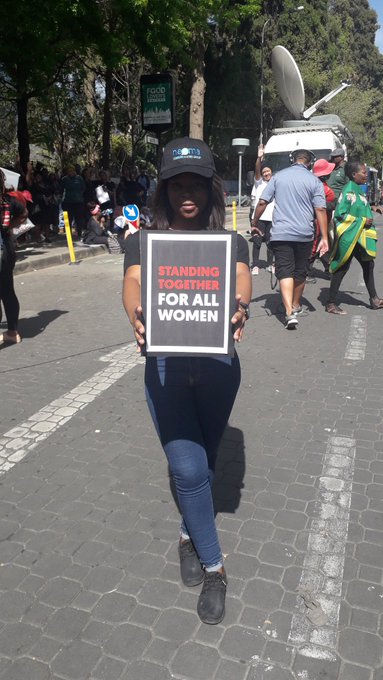

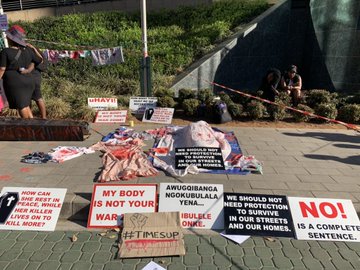
“Business can no longer continue as an innocent bystander,” wrote advocacy group Action Aid South Africa wrote in a tweet explaining the choice of the financial center as a target.

#TheTotalShutdown@WomenProtestSA
A 2% levy on profits to help fund the fight against GBV and femicide.
All JSE-listed companies must contribute to a fund to resource the National Strategy Plan on GBV and femicide. #SandtonShutdown #PayThePatriarchyTax #IWontBeNext
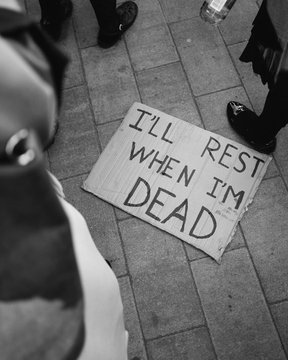
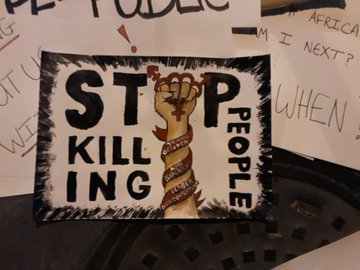
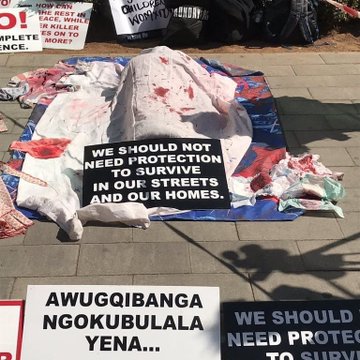
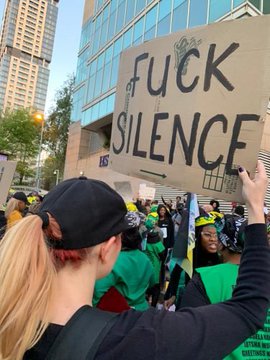
From BBC News:
There was a sombre mood at the protest, which brought traffic to a standstill in Johannesburg’s Sandton district.
Tears were rolling down the women’s faces as they started singing “Senzeni na?”, which loosely translated from Zulu means “what have we done to deserve this?”
New national police data underscores the depth of the problem.
Over 41,000 rapes were committed in the year ending March 2019—an increase of almost 4 percent from the previous year. Over 2,700 women were also murdered in the time frame. That amounts to a woman being murdered every three hours, Bloomberg noted.
Catalyzing the recent surge of protests was the brutal murder and rape of university student Uyinene Mrwetyana by a Cape Twon post office employee. The attack reportedly occurred when she was checking on a package.
Her murder, and recent others, have been a flash point, triggering protests including one last week that blocked the entrance to the World Economic Forum in Cape Town and launching the #AmINext movement.
“Every week, there is a story in South Africa that should stop us in our tracks—a newspaper report detailing what feels like a freak detonation of psychotic, demented violence against women, a one-off explosion of hate that somehow just keeps on happening,” Cape Town-based writer Rosa Lyster wrote at The New Yorker.
Referring to Mrwetyana’s murder, Lyster continued, “Confronted with the reality of how she died, and the knowledge that ‘the post office;’ must now be added to the long list of places to be scared of, women around the country are reaching what feels like a breaking point.”
“Mrwetyana’s death, so grotesquely emblematic of the state’s failure to protect women and children,” wrote Lyster, “seems to have channeled the anger that so many feel and directed it toward a clear target. The feeling that someone should do something is turning, quickly, into the conviction that someone is going to have to.”



